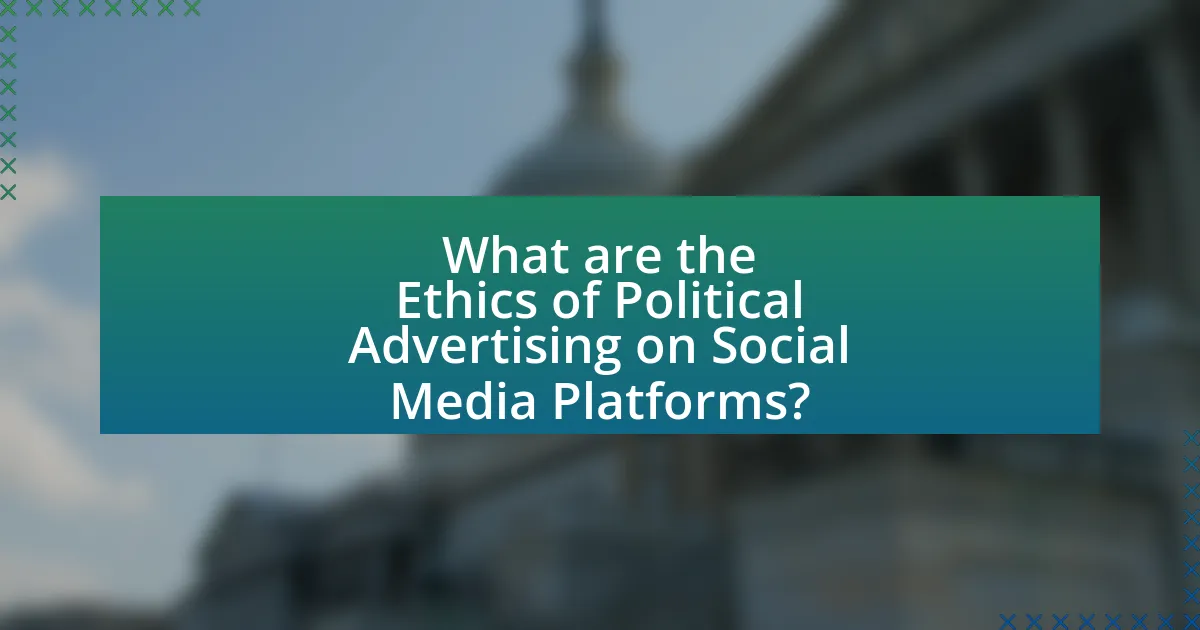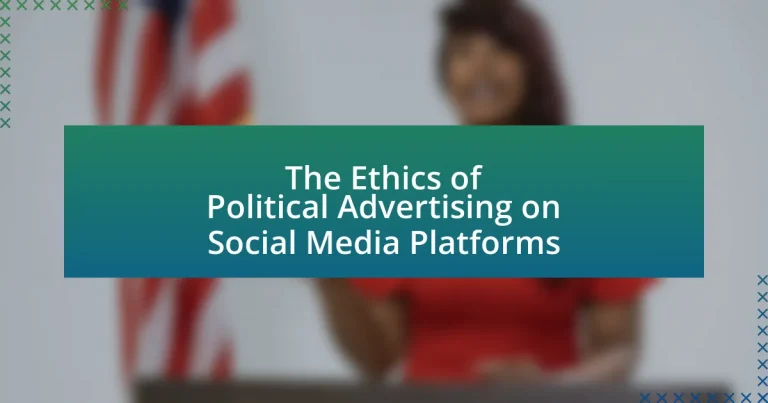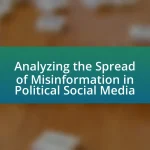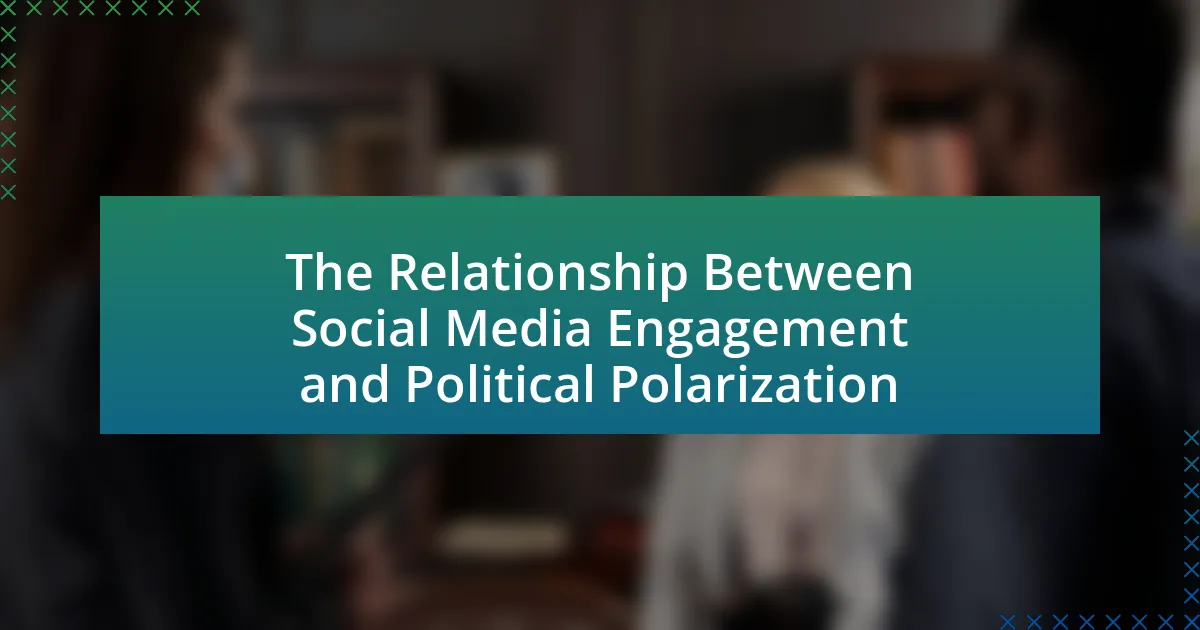The article examines the ethics of political advertising on social media platforms, focusing on key issues such as transparency, accountability, and the spread of misinformation. It highlights the importance of ethical considerations in political advertising to foster trust between candidates and voters, and discusses the ethical dilemmas that arise, including misinformation and data manipulation. The article also explores how different social media platforms implement varying ethical standards, the role of algorithms in shaping political content, and the responsibilities of platforms in regulating political ads. Additionally, it addresses user perceptions of ethical advertising, the implications of unethical practices on democratic processes, and potential future trends in regulatory measures and technological advancements aimed at promoting ethical standards in political advertising.

What are the Ethics of Political Advertising on Social Media Platforms?
The ethics of political advertising on social media platforms revolve around transparency, accountability, and the potential for misinformation. Ethical considerations require that political ads disclose funding sources and sponsorship to ensure voters can make informed decisions. For instance, the Federal Election Commission mandates that political advertisements include disclaimers about who paid for them, promoting accountability. Additionally, social media platforms face scrutiny for their role in allowing the spread of false information, which can manipulate public opinion and undermine democratic processes. Research by the Pew Research Center indicates that a significant portion of social media users encounter misinformation, highlighting the ethical obligation of platforms to monitor and regulate content effectively.
Why is ethical consideration important in political advertising?
Ethical consideration is important in political advertising because it ensures transparency, honesty, and accountability in the communication of political messages. Ethical practices help to build trust between candidates and voters, which is essential for a functioning democracy. For instance, misleading advertisements can distort public perception and influence electoral outcomes, as evidenced by the 2016 U.S. presidential election, where misinformation spread on social media significantly impacted voter behavior. By adhering to ethical standards, political advertisers can promote informed decision-making among the electorate, ultimately fostering a healthier political environment.
What ethical dilemmas arise in political advertising on social media?
Ethical dilemmas in political advertising on social media include misinformation, manipulation of user data, and lack of transparency. Misinformation can mislead voters, as seen in the 2016 U.S. presidential election, where false narratives spread rapidly online. Manipulation of user data raises concerns about privacy and consent, as platforms often use algorithms to target specific demographics without clear disclosure. Additionally, the lack of transparency in funding sources for political ads can obscure the true intentions behind campaigns, undermining democratic processes. These issues highlight the complex ethical landscape that political advertising navigates on social media platforms.
How do ethical standards vary across different social media platforms?
Ethical standards vary significantly across different social media platforms, influenced by their policies, user demographics, and regulatory environments. For instance, Facebook has faced scrutiny for its handling of political ads, implementing transparency measures like the Ad Library, which allows users to see who paid for ads and their targeting criteria. In contrast, Twitter has adopted a more stringent approach by banning political ads altogether, reflecting its commitment to reducing misinformation. Additionally, platforms like TikTok prioritize community guidelines that emphasize user safety and content moderation, which can lead to different ethical considerations regarding political content. These variations highlight how each platform’s unique policies and user engagement strategies shape their ethical standards in political advertising.
What role do social media platforms play in political advertising ethics?
Social media platforms serve as critical gatekeepers in the realm of political advertising ethics by regulating content, ensuring transparency, and combating misinformation. These platforms implement policies that dictate what constitutes acceptable political advertising, which includes guidelines on truthfulness and the disclosure of funding sources. For instance, Facebook and Twitter have established rules requiring political ads to be labeled and their sponsors identified, thereby promoting accountability. Additionally, studies, such as the Pew Research Center’s findings, indicate that a significant portion of users rely on social media for political information, underscoring the platforms’ influence on public perception and discourse. This regulatory role is essential in maintaining ethical standards in political advertising, as it helps mitigate the spread of false information and promotes informed voter engagement.
How do algorithms influence political advertising content?
Algorithms significantly influence political advertising content by determining which ads are shown to specific user demographics based on their online behavior and preferences. These algorithms analyze vast amounts of data, including user interactions, interests, and social connections, to optimize ad targeting and engagement. For instance, Facebook’s advertising algorithm uses machine learning to predict which users are most likely to engage with particular political messages, thereby shaping the content that reaches them. This targeted approach can lead to the amplification of certain political narratives while suppressing others, raising ethical concerns about misinformation and the manipulation of public opinion.
What responsibilities do platforms have in regulating political ads?
Platforms have the responsibility to ensure transparency, accuracy, and accountability in regulating political ads. This includes verifying the identity of advertisers, disclosing funding sources, and providing clear labeling of political content. For instance, Facebook implemented an ad archive that allows users to see who funded political ads and how much was spent, which enhances transparency. Additionally, platforms must combat misinformation by employing fact-checking services and removing false claims, as seen in Twitter’s policies against misleading political content. These measures are essential to maintain the integrity of democratic processes and protect users from deceptive practices.
How do users perceive the ethics of political advertising on social media?
Users generally perceive the ethics of political advertising on social media as problematic, often expressing concerns about misinformation and manipulation. A study by the Pew Research Center found that 64% of Americans believe that social media platforms have a responsibility to monitor political ads for accuracy. Additionally, users frequently report feeling overwhelmed by the volume of political content, leading to skepticism about the motives behind such advertisements. This perception is further supported by research indicating that exposure to misleading political ads can significantly influence voter behavior, raising ethical questions about the integrity of democratic processes.
What factors influence user trust in political advertisements?
User trust in political advertisements is influenced by several key factors, including the credibility of the source, the transparency of the information presented, and the emotional appeal of the content. Credibility is established through the reputation of the political figure or organization behind the advertisement; studies show that ads from well-known and respected sources are more likely to be trusted. Transparency involves clear disclosure of funding sources and intentions, which research indicates significantly enhances trust levels among viewers. Emotional appeal, such as the use of relatable narratives or compelling visuals, can also sway user perception, as advertisements that resonate emotionally tend to foster a stronger connection and trust.
How does misinformation impact user perceptions of ethical advertising?
Misinformation significantly distorts user perceptions of ethical advertising by creating distrust and skepticism towards advertised messages. When users encounter false or misleading information, they are more likely to question the integrity and authenticity of the advertisements they see, leading to a perception that ethical standards are not being upheld. Research indicates that 86% of consumers believe that misleading advertising is a serious issue, which reinforces the idea that misinformation can undermine the credibility of ethical advertising practices. This erosion of trust can result in negative attitudes towards brands and political entities, ultimately affecting their reputation and effectiveness in communicating their messages.
What are the implications of unethical political advertising practices?
Unethical political advertising practices undermine democratic processes by spreading misinformation and manipulating voter perceptions. These practices can lead to decreased public trust in political institutions, as evidenced by studies showing that exposure to false information can significantly alter voter beliefs and behaviors. For instance, a 2017 study published in the journal “Political Communication” found that misinformation in political ads can lead to a 20% increase in the likelihood of voters believing false claims. Additionally, unethical advertising can exacerbate polarization, as targeted misinformation often reinforces existing biases, creating a more divided electorate. This manipulation not only distorts the electoral process but also threatens the integrity of democratic governance.
How can unethical practices affect democratic processes?
Unethical practices can severely undermine democratic processes by eroding public trust and distorting the electoral landscape. For instance, misinformation campaigns on social media platforms can mislead voters, influencing their decisions based on false narratives rather than factual information. A study by the Pew Research Center found that 64% of Americans believe fabricated news stories cause confusion about the basic facts of current events, which directly impacts informed voting. Additionally, unethical targeting of specific demographics can manipulate voter behavior, as seen in the Cambridge Analytica scandal, where data misuse influenced voter preferences in the 2016 U.S. presidential election. Such practices compromise the integrity of elections, leading to outcomes that do not reflect the true will of the people.
What are the potential consequences for advertisers and platforms?
The potential consequences for advertisers and platforms include reputational damage, regulatory scrutiny, and financial losses. Advertisers risk losing consumer trust if their political ads are perceived as misleading or unethical, which can lead to boycotts and decreased sales. Platforms may face increased regulation from governments aiming to ensure transparency and accountability in political advertising, as seen in the European Union’s Digital Services Act, which imposes stricter rules on online political ads. Additionally, both advertisers and platforms could incur financial losses due to penalties or reduced advertising effectiveness if users disengage from platforms perceived as unethical.
How can ethical political advertising be promoted on social media?
Ethical political advertising can be promoted on social media by implementing transparent practices, such as disclosing funding sources and targeting criteria. Transparency builds trust with the audience, as evidenced by a 2020 study from the Pew Research Center, which found that 70% of users prefer ads that clearly state their funding sources. Additionally, platforms can enforce strict guidelines that prohibit misinformation and require fact-checking for political ads, which has been shown to reduce the spread of false information by up to 80% according to a 2021 report by the Digital Media Association. Engaging users through educational content about the political process and encouraging civic participation can further enhance the ethical landscape of political advertising on social media.
What best practices should advertisers follow to ensure ethical standards?
Advertisers should prioritize transparency, honesty, and respect for user privacy to ensure ethical standards. Transparency involves clearly disclosing the source of funding for advertisements and the intent behind them, which builds trust with the audience. Honesty requires that all claims made in advertisements are factual and verifiable, avoiding misleading information that could manipulate public opinion. Respect for user privacy entails adhering to data protection regulations, such as the General Data Protection Regulation (GDPR), which mandates that advertisers obtain consent before collecting personal data. These practices are supported by research indicating that ethical advertising fosters consumer trust and enhances brand reputation, ultimately leading to more effective campaigns.
How can social media platforms enhance transparency in political advertising?
Social media platforms can enhance transparency in political advertising by implementing clear labeling of political ads and providing access to detailed information about the sponsors. For instance, platforms like Facebook and Twitter have established ad libraries that allow users to view all active political ads, including information about the funding sources and targeting criteria. This practice aligns with regulations such as the Federal Election Commission’s requirements in the United States, which mandate disclosure of ad sponsors. By making this information readily available, social media platforms empower users to critically evaluate the content and motivations behind political advertisements, thereby fostering a more informed electorate.
What are the future trends in the ethics of political advertising on social media?
Future trends in the ethics of political advertising on social media include increased transparency, stricter regulations, and enhanced accountability measures. As public concern over misinformation and manipulation grows, platforms are likely to implement clearer disclosure requirements for political ads, ensuring that users can easily identify sponsored content. Additionally, regulatory bodies may introduce more stringent laws governing the targeting and dissemination of political messages, aiming to prevent deceptive practices. Research indicates that platforms like Facebook and Twitter are already experimenting with transparency tools, such as ad libraries, which allow users to see the funding sources and targeting criteria of political advertisements. These trends reflect a broader societal demand for ethical standards in political communication, driven by the need to protect democratic processes and promote informed citizen engagement.
How might regulations evolve to address ethical concerns in political ads?
Regulations may evolve to address ethical concerns in political ads by implementing stricter transparency requirements and accountability measures. For instance, lawmakers could mandate that all political advertisements disclose their funding sources and the identities of sponsors, similar to existing regulations in some jurisdictions that require disclosure of campaign contributions. Additionally, regulations could introduce penalties for misleading or false information in ads, as seen in the Federal Election Commission’s enforcement actions against deceptive practices. These measures aim to enhance public trust and ensure that voters have access to accurate information, thereby addressing ethical concerns surrounding manipulation and misinformation in political advertising.
What role will technology play in shaping ethical advertising practices?
Technology will play a crucial role in shaping ethical advertising practices by enabling greater transparency and accountability in political advertising. Advanced analytics and machine learning algorithms can track ad performance and audience engagement, ensuring that advertisers adhere to ethical standards. For instance, platforms like Facebook and Google have implemented tools that allow users to see the sources and funding of political ads, which promotes informed decision-making among voters. Additionally, technology facilitates the detection of misinformation and manipulative tactics, as seen in initiatives like Twitter’s labeling of misleading content. These technological advancements not only enhance the integrity of political advertising but also empower consumers to critically evaluate the information presented to them.
What practical steps can be taken to ensure ethical political advertising?
To ensure ethical political advertising, organizations must implement transparency measures, such as clearly disclosing the sources of funding for advertisements. This practice is supported by regulations like the Federal Election Commission’s requirement for political ads to identify sponsors, which enhances accountability and allows voters to make informed decisions. Additionally, establishing guidelines for truthful messaging can prevent the spread of misinformation, as evidenced by platforms like Facebook and Twitter, which have introduced fact-checking initiatives to verify claims made in political ads. Lastly, promoting diversity in advertising content can help represent a broader range of perspectives, fostering a more inclusive political discourse.




